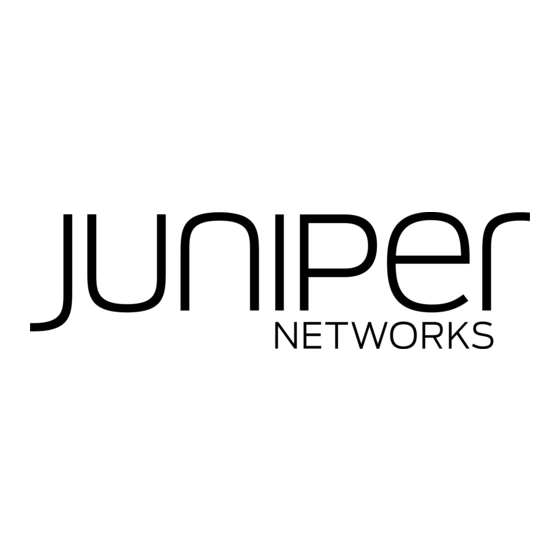Advertisement
Quick Links
Quick Start
Cloud-Ready SSR1400
IN THIS GUIDE
Step 1: Begin | 1
Step 2: Up and Running | 4
Step 3: Keep Going | 13
Step 1: Begin
IN THIS SECTION
Meet the Cloud-Ready SSR1400 | 2
Claim Your Appliance | 2
In this guide, we provide a simple, three-step path, to quickly get the Juniper Networks® SSR1400 appliance up and
running on Juniper Mist
™
using your computer. Once on-board, we'll walk you through the steps to create a basic configuration. You'll need your
Juniper Mist WAN Assurance subscription and your login credentials for the Juniper Mist portal.
NOTE: Before you begin, you must set up your organization and sites, and activate your subscriptions. For more
information, see
Quick Start:
cloud. You can on-board a single device using your mobile phone, or one or more devices
Mist.
Advertisement

Summary of Contents for Juniper SSR1400
- Page 1 IN THIS SECTION Meet the Cloud-Ready SSR1400 | 2 Claim Your Appliance | 2 In this guide, we provide a simple, three-step path, to quickly get the Juniper Networks® SSR1400 appliance up and running on Juniper Mist ™ cloud. You can on-board a single device using your mobile phone, or one or more devices using your computer.
- Page 2 Juniper® Session Smart Router (SSR) software, the SSR1400 provides secure and resilient WAN connectivity. The SSR1400 has four 1 GbE ports, four 1/10/25 GbE SFP28 ports, four 10 GbE SFP+ ports, a management port (for Mist operations), 256 GB of memory, and a 512 GB enterprise-grade solid-state drive (SSD) for storage.
- Page 3 5. On the Organization screen, tap Device Inventory → Routers → Unassigned. Review the MAC address. Onboarding Complete! Fantastic, the SSR1400 is in your inventory! To provision the SSR1400, see "Step 2: Up and Running" on page Enter the Mist Claim Code Claiming multiple devices—When you purchase multiple devices, we provide you with an activation code along with...
- Page 4 5. Clear the Assign claimed WAN Edges to site check box to place the SSR1400 in the inventory. The SSR1400 is assigned to a site later, see "Assign the SSR1400 to a Site" on page 6. Click the Claim button to claim the SSR1400 into your inventory.
- Page 5 Assign the SSR1400 to a Site | 11 Install the SSR1400 in a Rack | 11 Connect Your SSR1400 to the Mist Cloud | 12 Add the Network To begin your WAN design, identify the network to be used for accessing applications over a LAN network segment.
- Page 6 Add Applications Define the applications for the WAN to deliver, starting with the Internet. 1. Select Organization > Applications from the menu on the left. 2. Click Add Applications in the upper-right corner of the Applications page. Video: Access the Add Applications Page 3.
- Page 7 Configure the Application Policy | 10 Excellent! Now you have the SSR1400 waiting to be claimed, a network for your LAN, and an application. Next, you need to create a WAN Edge template that ties them all together! Templates are reusable and keep the configuration consistent for every SSR1400 you deploy.
- Page 8 4. Click Add. Configure the LAN Port Next, associate your LAN network segment with the appropriate port on the SSR1400. Scroll to the LAN section of the template, and click Add LAN. Video: Add LAN Configuration From the Network dropdown menu, select your network segment to associate it with the LAN port.
- Page 9 Finally, enter the IP addresses for the DNS Servers to be assigned to clients on the network. For example, 8.8.8.8, 8.8.4.4. 10. Click Add. Your template has the WAN and LAN information. Now, you need to tell the SSR1400 how to use the information to connect users to applications. This is done using traffic steering and application policies.
- Page 10 Configure Traffic Steering Policy To configure Traffic Steering policy: 1. Scroll to the Traffic Steering section of the template, and click Add Traffic Steering. Video: Add Traffic Steering Policy 2. Enter a name for the steering policy, for example, local-breakout. 3.
- Page 11 Great work! All that remains is to associate the SSR1400 with a site. Assign the SSR1400 to a Site After the SSR1400 is onboarded to the Mist cloud, you'll need to assign it to a site so you can begin to manage the configuration and gather data in Mist cloud.
- Page 12 3. Power on the SSR1400. Great job! Your SSR1400 is now connected to the Mist cloud! In just a few minutes, Mist will send the template-driven configuration down to your device. Once the configuration has been applied, it will begin forwarding sessions from LAN to WAN as described by your policy.
- Page 13 IN THIS SECTION SUMMARY What's Next? | 13 Congratulations! Now that you've done the initial configuration, your SSR1400 is ready to use. Here are some General Information | 13 things you can do next: Learn with Videos | 14 What's Next?
- Page 14 Juniper Learning Portal Juniper Juniper Networks, the Juniper Networks logo, Juniper, and Junos are registered trademarks of Juniper Networks, Inc. in the United States and other countries. All other trademarks, service marks, registered marks, or registered service marks are the property of their respective owners.









Need help?
Do you have a question about the SSR1400 and is the answer not in the manual?
Questions and answers